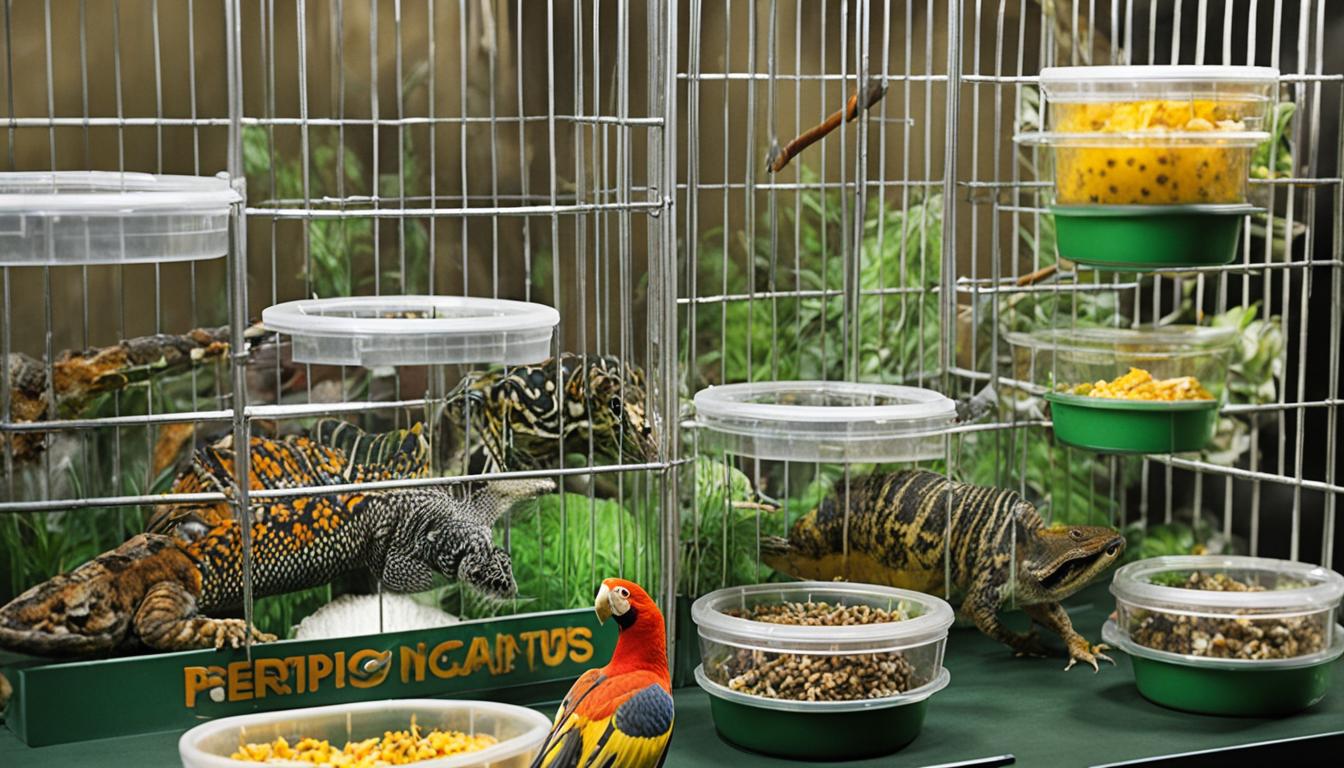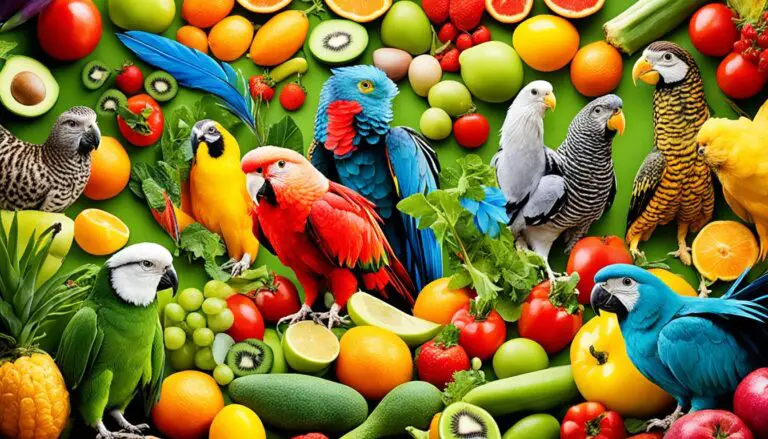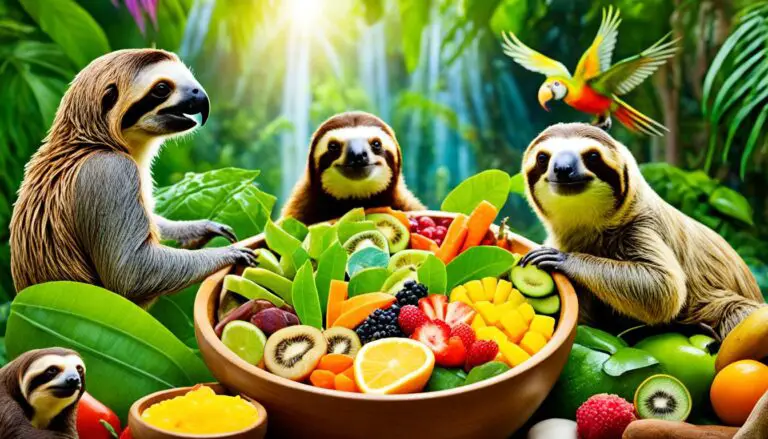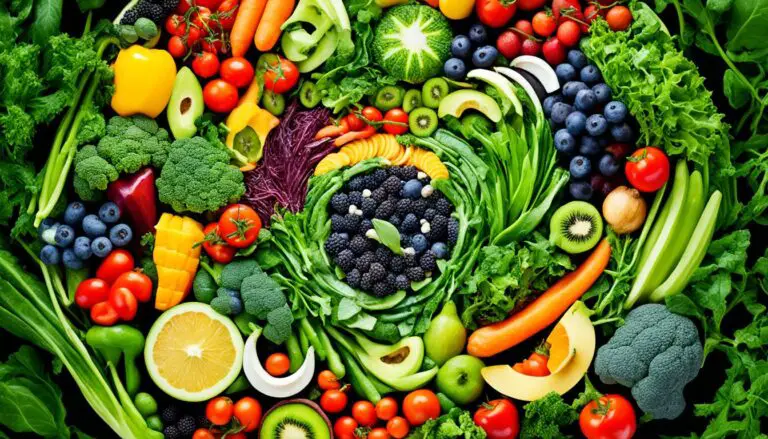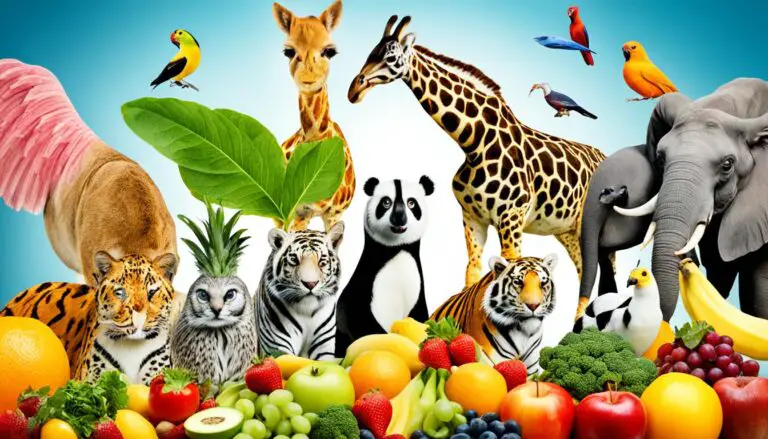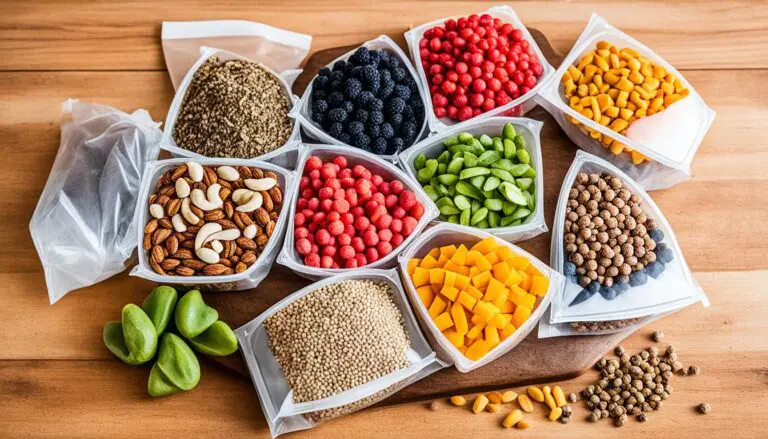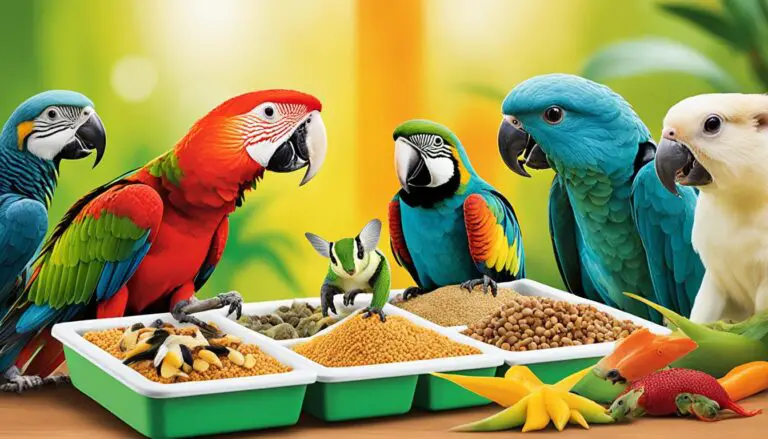Exotic Pet Feeding: Schedules & Portion Control
Feeding schedules and portion control are crucial for an exotic pet’s well-being. Giving the right food, at the right time, keeps them healthy. We’re going to show you why this matters and how to do it right. This is everything you need to know to keep your unusual pet in top shape.
Key Takeaways:
- Setting a feeding schedule and controlling portions is key for exotic pets’ health.
- Each exotic pet has unique dietary needs. Their food plans should match this.
- Find out the best diet for your pet. Also, mix up their food to cover all nutrients they need.
- When in doubt, talk to an expert for advice on feeding your exotic pet.
- Too much food can lead to health problems. Be careful not to overfeed your pet.
Feeding Guidelines for Birds
Birds like parrots, finches, and canaries need the right foods to stay healthy. It’s important to know what each species should eat. This way, they get the nutrients they need.
Parrot Diet
Parrots stand out with their colorful feathers and smart minds. They need a varied diet to stay in top shape. Their meals should include:
- Pellets: High-quality pellets are key for parrots. They fulfill many of their dietary needs well.
- Fruits and Vegetables: Adding fresh fruits and veggies is a must. Good choices are apples, oranges, carrots, and greens.
- Nuts: Nuts are good for healthy fats and protein. Almonds, walnuts, and brazil nuts are all great choices as treats.
Finch Diet
Finches, being small birds, do well on seeds. They need a mix of various seeds for a balanced diet. Some greens now and then keep things interesting and healthy.
Canary Diet
Canaries have their own food needs, requiring:
- Canary Seed Mixes: Quality seed mixes are vital for their main meals.
- Fresh Greens: Plants like spinach, dandelion leaves, and kale are enjoyed by canaries. They add important nutrients.
- Egg Food: A bit of egg food now and then is good for extra protein. This can boost their nutrition.
Don’t forget about fresh water for all birds. It’s their most essential drink. Change it every day to keep it clean and healthy for them.
“Birds, just like humans, require a balanced diet to thrive. Proper nutrition ensures their overall health and helps prevent common health issues.”
| Bird Species | Main Components | Additional Foods |
|---|---|---|
| Parrots | Pellets, fruits, vegetables | Nuts |
| Finches | Seed mix | Occasional greens |
| Canaries | Canary seed mixes | Fresh greens, egg food |
Dietary Requirements for Reptiles
Feeding reptiles correctly is key for their health and happiness. Every type of reptile has its own diet needs. This is to make sure they get the right nutrition. We will explore what bearded dragons, turtles, tortoises, and snakes need to eat.
Bearded Dragon Diet
Bearded dragons love to eat both insects and vegetables. They should have a mix of bugs like crickets and greens like kale. These foods give them the protein and vitamins they need.
Don’t forget: bearded dragons must also eat greens like bok choy. These veggies give them extra vitamins. You can also mix in carrots to make their meal extra healthy.

Turtle and Tortoise Diet
Turtles and tortoises, on the other hand, eat different things based on if they live in water or on land. Water turtles should have floating plants and tiny creatures. Land turtles eat dark greens and veggies. Russian tortoises, for example, like to munch on dandelion greens.
Adding vegetables like bell peppers will keep them healthy too. For both kinds of turtles and tortoises, always offer a variety. This keeps them happy and healthy.
Snake Diet
Snakes eat meat, and their main meals are animals like mice. For a balanced diet, snakes might also eat rats or rabbits. This ensures they get all the protein and nutrients they require.
Pick the right size food for your snake. Too big of a meal can harm them. Always make sure their food is a good fit.
It’s very important to feed your reptiles the correct foods. Doing so will keep them in good shape for years. By knowing what bearded dragons, turtles, tortoises, and snakes like to eat, you can ensure they are well-fed and healthy.
Unique Diets for Other Exotic Pets
Some exotic pets like hedgehogs, sugar gliders, and even invertebrates have special eating needs. It’s vital to give them the right food for their health and happiness.
Hedgehog Diet
Insectivorous hedgehogs need a diet that mixes special hedgehog food with bugs, fruits, and veggies. Adding high-quality dry cat food is good too. It’s all about providing a mix to cover their nutritional bases.
Sugar Glider Diet
Omnivorous sugar gliders eat fresh fruits, veggies, pellets, and bugs. They must have a varied diet to stay healthy. Apples, grapes, and bananas are good fruits, and veggies like carrots and greens are also great.
Invertebrate Diet
For invertebrates like tarantulas and scorpions, it’s all about the bugs. They need live insects such as crickets and mealworms for their protein and nutrients.
Important Tip: Ensure the insects are well-fed before your pets eat them. This step, called gut-loading, boosts the nutrition your pets get.
Getting the right nutrition is essential for all exotic pets. A balanced diet keeps them healthy and happy. Remember, advice from a vet or exotic pet expert is always a good idea.
General Feeding Tips for Exotic Pets
Feeding your exotic pet means knowing what they eat. Learn your pet’s special diet. This will keep them healthy and happy.
- Research: Look up what your exotic pet should eat. Every animal type needs different foods. Knowing this helps you feed them correctly.
- Variety: Give your pet many food types to get all nutrients. They can eat insects, fruits, veggies, and special pellets.
- Supplements: Some pets need extra nutrients in pills or drops. For example, reptiles need more calcium. Ask a vet if your pet needs this.
- Hydration: All pets need clean water every day. Make sure yours can easily drink fresh water.
- Portion Control: Don’t give your pet too much food. This avoids obesity. Follow the feeding amounts for your type of pet.
Nutrition is crucial for your exotic pet’s health. Use these tips to give them the best food for a great life.
To feed your exotic pet well, know what they need. Offer a mix of foods. Add supplements if your vet says it’s needed. Also, don’t feed them too much.
Common Exotic Pets and Their Nutritional Requirements
| Exotic Pet | Nutritional Requirements |
|---|---|
| Parrots | Well-balanced diet including pellets, fruits, vegetables, and nuts |
| Bearded Dragons | Mixture of insects, leafy greens, and vegetables |
| Hedgehogs | Commercial hedgehog food supplemented with insects, fruits, and vegetables |
| Sugar Gliders | Combination of fresh fruits, vegetables, pellets, and insects |
| Snakes | Carnivorous diet consisting mainly of rodents |

Importance of Ideal Body Condition for Pet Longevity
It’s key to keep your pet fit to help them live longer. Just like us, they can get overweight, causing health problems and a shorter life. By watching their food and checking their body condition, you can keep them healthy and happy.
The Pet Body Condition Score
The body condition score helps us see if a pet is at the right weight. A good score means they look healthy – you should see a waist and just feel ribs. Checking this score often is important for your pet’s health.
Portion Control for Pets
Feeding the right amount is crucial for your pet’s weight. Measure their food based on their needs to avoid overfeeding and obesity. Your vet can help figure out the best meal sizes for your pet.
Preventing Obesity and Related Health Issues
Obesity can cause serious health issues in pets like diabetes, joint pain, and heart problems. By managing their food and keeping them active, you can prevent these conditions and help them live a better life.
Make sure they get enough exercise and eat a balanced diet. This is the best way to keep your pet’s weight in check and support their health.
“By implementing portion control and monitoring your pet’s body condition score, you can help them maintain a healthy weight and enjoy a long, fulfilling life.”
Focusing on your pet’s weight and how much they eat helps them stay healthy. Always talk to your vet about the right portion sizes for your pet. They’ll consider your pet’s breed, age, and how active they are to give you the best advice.
| Pet Body Condition Score | Description |
|---|---|
| 1 | Emaciated: Ribs, spine, and pelvic bones are easily visible. No palpable fat. |
| 2 | Underweight: Ribs and spine are visible, but with a thin layer of fat over them. Minimal abdominal fat. |
| 3 | Ideal: Ribs are palpable without excess fat. Waistline is visible behind the ribs. |
| 4 | Overweight: Ribs are difficult to palpate due to excess fat. Waistline is barely visible. |
| 5 | Obese: Ribs can’t be palpated due to excessive fat deposits. Waistline is not visible. |
Portion Control for Pet Food
It’s vital to keep an eye on the amount of food your pets eat. If you measure their food, you’ll know they get just enough. This is key to keeping them healthy and not too full. Portion control also has many other good points for your pet’s well-being.
The Benefits of Portion Control
- Promotes a healthy weight: Watching your pet’s food portions can stop them from getting too heavy. This helps them live longer and feel better.
- Prevents overeating: Some pets will eat too much if they can. By giving them set amounts, you prevent this and the problems that come with it.
- Ensures balanced nutrition: Using the right portion sizes means your pet eats a varied and healthy diet. This ensures they get what they need to stay fit.
- Easy meal planning: With food already measured, feeding time is a breeze. It lets you keep an eye on how much your pet eats and when.
It’s best to use a kitchen scale for precise portion control. This way, you’re sure your pet gets the exact amount they need for their health.

Adjusting your pet’s food amounts is simple when you measure. Whether it’s keeping them steady or losing some pounds, talk to your vet. They’ll guide you on the best amounts based on your pet’s details.
Summary
Portion control is critical for your pet’s health. Measurements and the right portion sizes can help keep your pet from being overweight. It makes sure they eat healthily. Always get advice from your vet on how much to feed your pet.
| Benefits of Portion Control |
|---|
| Promotes a healthy weight |
| Prevents overeating |
| Ensures balanced nutrition |
| Easy meal planning |
Diet Guidelines for Bearded Dragons
Bearded dragons are cool pets because they’re gentle and look unique. They need the right food to stay healthy. Since they eat both animals and plants, a varied diet is key for their well-being.
Feeder Insects for Bearded Dragons
Protein-rich insects are a must for these lizards. They help with muscle growth and provide important nutrients like protein and calcium. Some favorite insects are:
| Feeder Insect | Nutritional Benefits |
|---|---|
| Crickets | High in protein and easily available |
| Dubia Roaches | Rich in protein and low in fat |
| Black Soldier Fly Larvae | High in calcium and low in phosphorus |
| Mealworms | Good source of protein |
| Phoenix Worms | High in calcium and low in fat |
Always give your dragons bugs that are the right size. This keeps them from choking. A good tip is to not feed them insects wider than their eyes.
Leafy Greens and Vegetables for Bearded Dragons
Greens and veggies are vital for vitamins and fiber. Dark greens are especially good. Here are some top picks:
- Kale
- Mustard Greens
- Collard Greens
- Turnip Greens
- Dandelion Greens
Don’t forget other veggies to mix up their diet. These are some good ones:
- Bell Peppers
- Carrots
- Squash
- Zucchini
- Butternut Squash
Cut the veggies small to avoid choking. And, always wash them well to remove any bad stuff.
Fruits for Bearded Dragons
Fruits are like special treats for bearded dragons. But, too much can cause weight problems and upset stomachs. Safe fruits include:
- Apples
- Berries (strawberries, blueberries, raspberries)
- Melons (watermelon, cantaloupe)
- Papaya
- Mango
Cut the fruits so they’re small and easy to eat.
If you’re ever unsure about your dragon’s diet, talking to a vet is a good idea. They can help you choose the right foods for your pet.
Vegetable and Fruit Options for Bearded Dragons
Bearded dragons need a mix of safe veggies and fruits for good health. It’s vital to give them a diverse diet full of essential nutrients. Here are some safe options for their meals:
- Safe Vegetables for Bearded Dragons:
- Acorn Squash
- Bell Peppers
- Collard Greens
- Endive
- Mustard Greens
- Parsley
- Turnip Greens
- Safe Fruits for Bearded Dragons:
- Apples
- Bananas
- Blueberries
- Mangoes
- Strawberries
- Watermelon
These veggies and fruits are safe but remember, give them in moderation. Be sure to make leafy greens and insects the main part of their diet. This way they get all the nutrients they need.
Always wash the food well to get rid of any chemicals. Add new foods slowly and keep an eye on how your dragon reacts. This helps make sure they are okay with the new foods.

A diet full of different veggies and fruits will keep your bearded dragon healthy. They’ll also love the variety and get important vitamins and minerals from their food.
Hydration and Supplementation for Bearded Dragons
Hydration is key for bearded dragons’ health. They get some water from food but need clean water available. Place a shallow water dish within easy reach of your dragon.
Bearded dragons also need special nutrients for good health. Adding calcium and vitamin D3 to their diet is important. Calcium is vital for their bones and can be sprinkled on insects or food.
Vitamin D3 helps the body use calcium. It comes from sunlight, special lamps, or supplements.
Nutritious feeder insects are a must for a bearded dragon’s diet. Crickets, dubia roaches, and mealworms are great options. These insects should eat vegetables and quality feed for your dragon’s benefit.
Recommended Supplements for Bearded Dragons
| Supplement | Function | Usage |
|---|---|---|
| Calcium | Promotes strong bones and muscle function | Dust onto prey insects or mix with food |
| Vitamin D3 | Aids in calcium absorption | Obtained through proper UVB lighting or through supplements |
Using supplements must be done carefully. Always check with a vet or expert. Too much can harm your pet.
Proper hydration and supplements are vital for bearded dragons. Clean water, healthy insects, and the right nutrients will keep your dragon happy and healthy.
Conclusion
Proper nutrition is critical for the health of exotic pets. It’s crucial to follow feeding schedules and offer a balanced diet. This ensures they live long and happy lives.
Seeking advice from experts in exotic pet nutrition is wise. Veterinarians and specialists can tailor a diet just for your pet. They consider your pet’s species, age, and size.
Feeding exotic pets means more than just putting food in a bowl. It’s about understanding what they need and setting up a good routine. By following expert advice, your exotic pet will flourish and have a great life.
FAQ
What are some common feeding guidelines for birds?
What are the dietary requirements for reptiles?
What are some unique diets for other exotic pets?
Are there any general feeding tips for exotic pets?
How does ideal body condition affect pet longevity?
What is the importance of portion control for pet food?
What should be included in a bearded dragon’s diet?
What are some vegetable and fruit options for bearded dragons?
How do you ensure hydration and supplementation for bearded dragons?
What are some key takeaways for feeding exotic pets?
Source Links
- https://leashestoleads.com/feeding-exotic-pets-a-guide-to-proper-nutrition/
- https://dragonsdiet.com/blogs/dragon-care/the-complete-bearded-dragon-diet-plan
- https://www.amcny.org/blog/2012/01/09/the-importance-of-portion-control-for-pets/
Peter Stones is the founder of Exotic Pets Place, the leading online resource for exotic pet care information.
With over 10 years of hands-on exotic pet ownership experience, he is deeply passionate about sharing his expertise to help others properly care for their unusual pets.
When he's not writing extensively researched articles or connecting with fellow exotic pet enthusiasts worldwide, you can find Peter at home tending to his own beloved menagerie of exotic animals.

